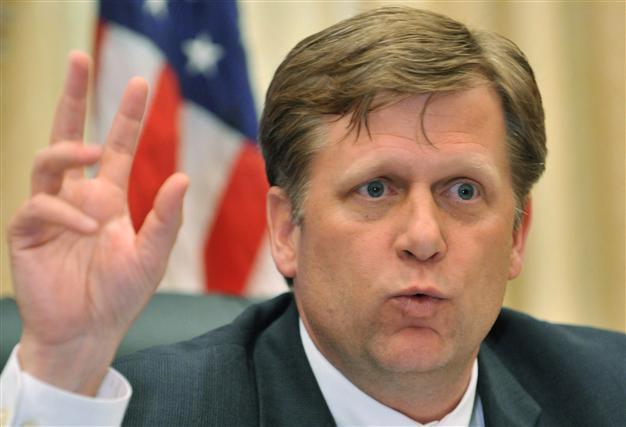Russia-US tensions flare over adopted boy's death
MOSCOW - Agence France-Presse

A file picture taken on May 4, 2010, shows US ambassador to Moscow, Michael McFaul , speaking at a press conference in in Bishkek. AFP Photo
The US ambassador to Moscow and a top Russian lawmaker traded verbal blows Thursday over the death of a Russian child adopted in the United States, in a row that threatens to overshadow upcoming talks with the new US secretary of state.
The emotionally charged exchange came after US ambassador Michael McFaul refused to show up in the Russian parliament's lower house to answer questions about recent deaths of Russian children adopted by American parents.
"By refusing to come to the State Duma to discuss the deaths of our children the US ambassador has shown that they are not ready for a serious dialogue on this problem," Alexei Pushkov, the head of the Duma committee on international affairs, wrote on Twitter.
McFaul countered that he was "always happy" to meet Russian officials to discuss adoptions but would not do so in parliament.
"As a norm, US ambassadors to not participate in hearings of foreign parliaments," he tweeted. "Do Russian ambassadors?" Irina Yarovaya, the chairperson of the Duma's security committee, issued an even more poisonous diatribe, accusing McFaul of preaching democracy but ignoring the deaths of Russian children.
"Apparently, he believes it is undemocratic to acknowledge inaction of the US authorities over the violence and abuse of small children," she said in acid remarks posted on the website of the parliament's lower house.
Since Putin's return to the Kremlin for a third term in May, Russia and the United States have been at odds over a growing number of issues. Late last year, Russia banned all adoptions by American parents, a measure that came in reprisal for US legislation that targets Russian officials deemed to have committed rights abuses.
Tensions flared again earlier this week over the January death in the United States of a 3-year-old Russian boy, Maxim Kuzmin, with Russian investigators saying the boy was murdered by his adoptive American mother.
The little boy's death will be among key topics of a meeting next week between Russian Foreign Minister Sergei Lavrov and new US Secretary of State John Kerry, the foreign ministry's human rights envoy Konstantin Dolgov told Russian lawmakers on Thursday.
If the ongoing investigation proves that the US parents murdered their adoptive Russian son, they will be severely punished, he said in comments posted on the website of the ruling United Russia party.
"They will not be released in court as it happened before, it will not be a five or two years' suspended sentence. It will be an adequate, severe punishment," Dolgov was quoted as saying.
The head of the powerful Investigative Committee, Alexander Bastrykin, vowed Thursday that all American parents found guilty of murdering their Russian children would be prosecuted.
He said 21 Russian children had died in the United States in recent years, and in ten of those cases American parents were being prosecuted at home.
Russia has opened criminal probes into the deaths of another seven children, Bastrykin said.
Some officials have recently raised the prospect of Russia banning all foreign adoptions in the future and even bringing back home the Russian orphans already adopted by American parents and living in the United States.
The blanket ban on US adoptions proved highly controversial in Russia, with critics saying that many orphans will never be able to receive adequate medical help at home. Last month, at least 20,000 protesters marched through Moscow to protest the measure, dubbing it the "scoundrels' law." More than 100,000 signatures have been collected against the law but the parliament have ignored calls to repeal it.
Observers note that scores of children die at state institutions and at the hands of Russian parents every year.
